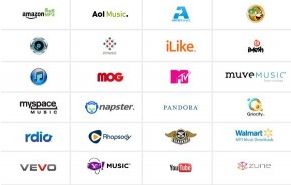According to the Recording Industry Association of America (RIAA) several industry leaders from music, movie, television and broadband services have teamed up to educate consumers and diminish online content theft. Among the organizations volunteering are Walt Disney Studios Motion Pictures, Paramount Pictures Corporation, Sony Pictures Entertainment, Twentieth Century Fox Film Corporation, Warner Bros. Entertainment Inc, Universal Music Group Recordings, Warner Music Group, Sony Music Entertainment, EMI Music North America, AT&T, Comcast Corp, and Verizon. These companies and more have all come together to create the foundation for the new Copyright Alert System.
Piracy is a major problem and even with the increased prevention and restrictions it continues to plague the various entertainment industries. For most individuals downloading protected media is often viewed as a minor crime, if one at all. When compared to other illegal activities it does seem minor however when considering the worldwide accumulation of pirated material obtained without compensation the loss and industry devastation is in the millions. The impact of piracy is felt by all parties involved in the media creation process and not only does it affect jobs but the future production of the content we enjoy. As the volume of pirated content continues to increase the amount of revenue continues to decrease and even with digital sales the earned revenue isn’t enough to make up the loss.
P2P file sharing programs like LimeWire are illegal as you can tell upon visiting their court ordered deactivated website. Organizations like the RIAA continually monitor these applications and focus their resources on disbanding them. Fortunately for users there is a ton of legal alternatives for low cost digital content. Some of these programs include Amazon, iTunes, Napster, Pandora, and AOL Music.
According to the RIAA Piracy FAQ
- In the decade since Peer-to-Peer sharing sites like Napster emerged in 1999, the music sales in the U.S. have dropped 47 percent. ($14.6 billion to $7.7 billion)
- From 2004 through 2009 approximately 30 billion songs were illegally downloaded.
- Only 37 percent of music acquired by U.S. consumers in 2009 was paid for.
- United States Internet users annually consume between $7 and $20 billion worth of digitally pirated recorded music.
- Digital theft of music, movies and copyrighted content takes up huge amounts of Internet bandwidth (24 percent globally and 17.5 percent in the United States)
- While the music business has increased its digital revenues by 1,000 percent from 2004 to 2010, digital music theft has caused the global market decline of around 31 percent in the same period.
- Global music piracy causes $12.5 billion of economic losses every year
- Piracy has resulted in the loss of 71,060 U.S. jobs, the loss of $2.7 billion in workers’ earnings, the loss of $422 million in tax revenues, the loss of $291 million in personal income tax, and the loss of $131 million in lost corporate income and production taxes.
The new copyright alert system is said to work similar to a fraud alert warning. This new system will alert users when their Internet service account may have been used to obtain the stolen content. When a user is suspected of content theft the Copyright Alert system will initiate an email or pop-up window warning. A user will be given up to 6 of these warnings before the Internet service provider begins to take mitigations measures. In order to inhibit users from repeated content theft ISP’s can potentially take actions that include slowing the web speed or redirecting the user to a page with “please contact your Internet Service Provider”. However, the telecom companies will not turn over the names of the individuals who pirated the content nor will they shut down the Internet service for that user.
Prior to this cooperation Internet Service Providers didn’t have a solid framework to operate on when faced with copyright theft. They would often simply forward the notification or complaints from the content owner to the user suspected of pirating content. The parties involved with this new agreement aim to create substantial guidelines and best practices that sufficiently alert subscribers, protect copyrighted content and influence the use of legal online content.
The six warning early notification system was established because in some cases the users might not know that the content is illegal or even being accessed. For example parents may not realize that their children are downloading content. The early warning system will provide sufficient warnings so that the parents or users who may be intentionally obtained illegal content can rectify the situation, prevent future incidents and avoid the ISP’s mitigation methods.
The RIAA expresses that “The Copyright Alert System is based on a consumer’s “right to know” when his or her Internet account may have been used improperly to download copyrighted content. The data suggest that, once informed about the alleged content theft and its possible consequences, most Internet subscribers will quickly take steps to ensure that the theft doesn’t happen again.”
The partnership has also called for the creation of a Center for Copyright Information to offer support and education for consumers. The Center for Copyright Information as well as the Copyright Alert System and ISPs will begin incorporating Copyright Alerts in 2011 and 2012. Through education and implementation, this alliance sets forth to not only eliminate piracy but influence future collaborations to achieve common goals.
For a full list of companies involved in the Copyright Alert System Framework visit RIAA Company Collaboration.
Thanks for Reading and Have a Great Day!
Dustin








